Our World is getting better all the time - with statistics to prove it
Many of us tuning into the news might be thinking our World is heading for certain doom. There's often horrible news, and that's what the mainstream media thrives on. Feeding on fear, uncertainty and doubt. We have all felt it. We know the media's biases, yet can't help but feel down.
It is important to put things into perspective. This is what this article intends to do, compiling data from various sources that point to an unanimous truth - Our World is getting better all the time.
The format of this article would be a chart followed by analysis - some of which I have compiled myself in my style, while some I have republished. The source and data for each will be mentioned clearly. We will look at - Violence (Homicide and War), Health, Education, Human Rights and Environment.
But first, this post is inspired by the amazing book "Better Angels of our Nature" by Steven Pinker. Due to the nature of the blogging format, I'll only touch upon a limited set of data very briefly. For a comprehensive analysis of the situation, I heartily recommend checking out this book. For this post, accusations of cherry picking would be fair due to the limited data set, but not so with Pinker's book.
Five hundred years ago - There Was Blood
500 years is an absolute blink of an eye in evolutionary terms. If life has existed for an entire year, the last 500 years are just a couple of seconds in that year!
So let's look back at life 500 years ago, in general. Most nations were ruled by power hungry kings and authoritarian entities. There was constant war, while the citizens struggled to survive. Famine, disease and crime was widespread. People murdered each other on petty disagreements, and the law never managed to cope with rampant crime. Ego, self-preservation and greed run amok while compassion took a back seat. You couldn't blame them either - it was a harsh life.
Source: Eisner (2003) – Long-Term Historical Trends in Violent Crime. In Crime and Justice, UNODC, Max Roser
Perhaps the most widespread impact of violence are homicides. While wars may not affect most citizens, homicides affect everyone.
Right away, it's clear as day - homicide rates have absolutely plummeted! Continually throughout the decades. The chance of getting killed in 1450 was akin to that of getting into a fight today. Things are 40-50 times safer today.
It's worth nothing that there was a temporary uptick in US Homicide Rates between 1970 and 1990 - but no other major county. But it has been declining steadily since then.
War
There is no human activity as devastating as War. This awesome chart collapses all the major war activity worldwide for the last few centuries. Note that this is chart is after the Mongol Conquests, which is among the deadliest manmade events of all time - wiping off 12% of the world's population! Compare that to just 2.2% for World War II. It would be way off this chart.
Source: OurWorldinData.org (visit for further sources)
There are many way to look at this chart. Humanity was very late to realize the futility of war, relative to some other metrics here. Minor / local wars have been in the decline for a long time, but till World War II they were compensated for by major global wars. Overall, despite ups and downs, the destructive impact of wars remained constant for 500 years. It took World War II for us to come back to our senses.
War since World War II
Source: PRIO Data, Wikipedia Ongoing Conflicts (See for further sources)
There was an spectacular decline right after World War II. This was the turning point. Once things settled down following WW2 aftermath, there was relative peace, with some hairy moments over the Cold War. This century, despite the Iraq War, is the most peaceful humanity has ever been.
The sharp eyed of you will notice a slight increase this decade. However, that has hit its peak in 2014. It's true that the Levant conflict has grown in 2015 and 16, but on the other hand, the East African conflicts have settled down.
Health
While wars may have been deadly, disease and epidemics were far worse. Black Death killed off over 30% of Europe's entire population in half a decade! Healthcare has been improving steadily, as has life expectancy. It's hard to believe, but just a 100 years back, most people were expected to die in their late 40s to early 50s. Today, most people think about living till into their 70s or 80s. There have been incredible advances in healthcare, and continues to this day, with no signs of slowing down.
Source: The World Bank
Education
Western Europe was early to the idea of education for all. It is the root of any major growth for our civilisation whether it be cultural (The Renassaince) or technological (Industrial Revolution). Some other regions such as South Asia and Africa have only very recently recognized the power of education. These regions are growing their education programs sharply. It's only a matter of time before these regions attain 100% basic education which the more developed regions did in the late 20th century. There will be great progress in human ingenuity once that happens.
Source: Clio Infra, OurWorldinData
Human Rights
Human rights has been the central tenet of any progressive society. The ride has been rocky - the Cold War particularly led to xenophobia and excessive conservatism. Since then, though, it has been a significant uptick in human rights protection across all spheres. This is one of the most obvious changes we have noticed in our lifetime.
For a detailed analysis, check out the awesome paper linked in the Source.
Source: Dynamic Patterns of Human Rights Practices by Schnackenberger and Farris
Environment
It's pretty clear that the world has got better and humanity has progressed immensely. But at what cost? This is one are where have messed up real bad. From pollution to deforestation to climate change, we have stripped the planet's life resources to our own advantage. Climate change is of course the number one issue, but I wanted to share a different data set which is even more alarming.
Source: Accelerated modern human–induced species losses: Entering the sixth mass extinction.
A is highly conservative, B is conservative, so the situation is much worse.
We have entered a mass extinction - the biggest one since the K/T extinction event that killed off the non-avian dinosaurs. Over the coming decades, this event - Holocene extinction - will become a major point of discussion.
The environment may be in the doldrums, but 0there's optimism that we have reached the bottom and are fighting back. Here's a great talk by Al Gore on the matter, with further statistics that show how we are back on the positive track. This could be our World War II moment, where things improve significantly for the better.
The Future
The Millennium Project has an intriguing index which covers all these factors into a single "State of the Future" (SOFI) index. The prognosis is bright despite some challenges.
Do check out more about the SOFI.
We have challenges, but we are doing just fine
There's no question that our World has major challenges, most significant of those being the environment and in the short term, terrorism. But look back through a millennia of history. Time and time again, humanity has proven that we can fix our problems, often dramatically.
So next time you feel down, remember that things have been getting better for centuries, and will continue to do so long after we are gone.
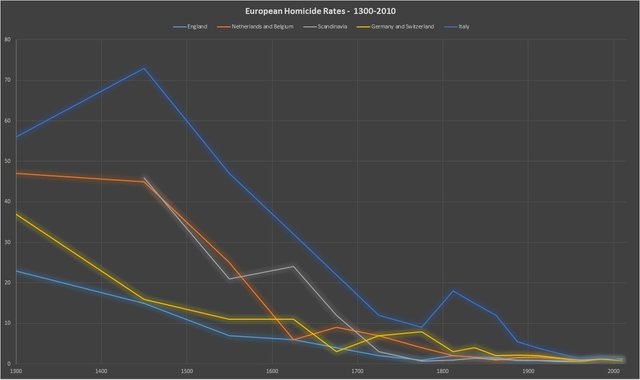
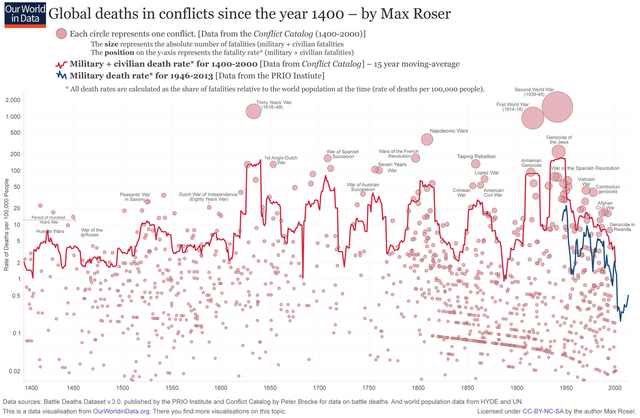
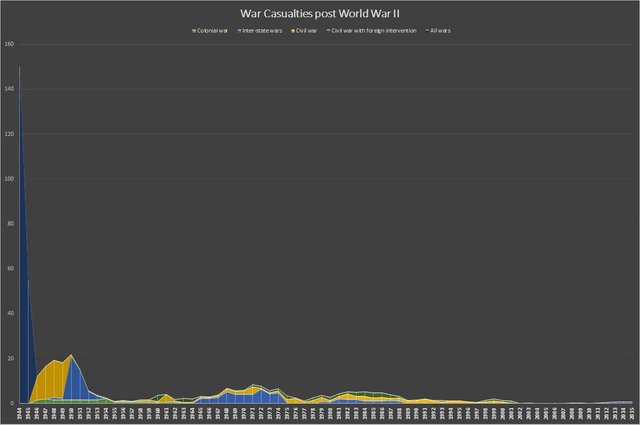
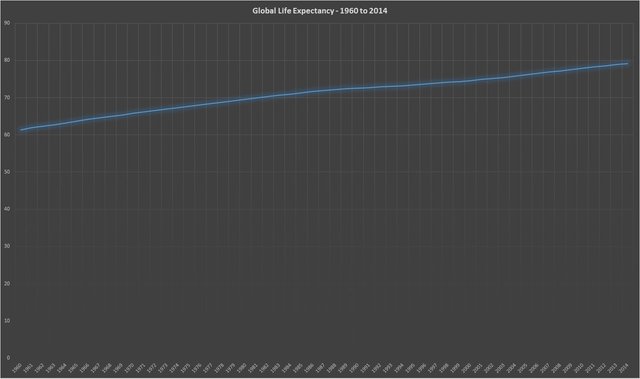
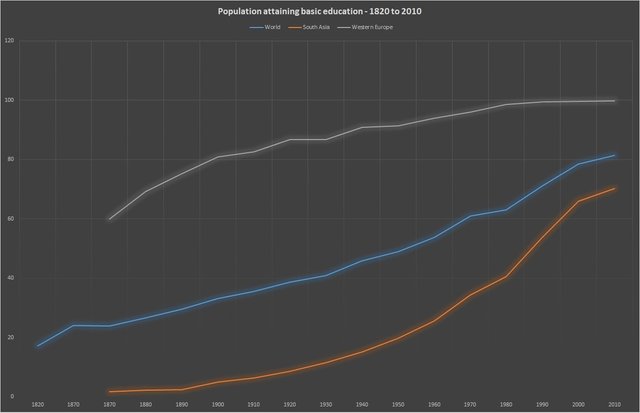
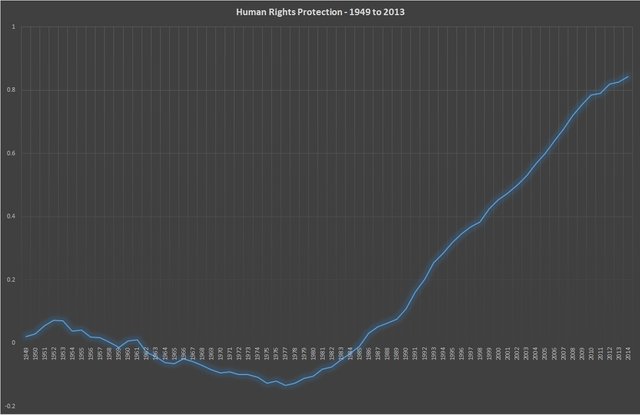


I agree with you! the most important thing - it is not to watch television and to take information from different sources! you did it! thank you!
Watch television by all means - but be aware of what you are seeing, and most importantly, do your own research. :)
Yes it is! but many people watch more standard news. and they only talk about what they want to impress! Well now there STEEMIT, is another means of reliable information. Every fact can be verified! I support you! thanks for the info
This was a great write up, but I don't know ...
This sounds like you're describing today. We're still in constant war, we just don't ask for authorization anymore and we've changed the title from war to "military actions" that don't necessarily need a declaration or permission, just a president with an agenda. According to some estimates, governments globally have killed upwards of 250 million citizens, outside of war. Citizens are still struggling to survive and if they didn't accept the tit of government, this whole house of cards would tumble under the weight.
I surely don't mean to be negative, that isn't my intention. I guess I just felt kinda crappy that your description of 500 years ago could apply very very easily to today.
It's all relative, @prufarchy. You are being overly negative. Your statement would be true if the United States, the UK, Germany, France, Russia, Japan and China were all at Total War today. None of these players are at war with each other, and not even close to being Total War. Japan have even revoked their constitutional right to declare war.
Here's a great chart that illustrates this (source embedded in the image) -
PS: There is war today, yes, but they are in minute pockets. We are far from World Peace, but compared to World War II 70 years ago, statistically we are 99.33% of the way there!
The world powers don't need to be at total war for my statement to be true. Myself I was involved in Operation Enduring Freedom and Operation Iraqi Freedom, with some estimates putting the civilian death toll upwards of half a million humans. We haven't declared war against Syria, Libya... we don't declare war when we send in intelligence forces to depose or destabilize countries that don't align with our agenda. Maybe technology has obviated the need for direct "total" war, instead casting it into the cyber/drone/political war arena. Make no mistake, there is an active cyber war underway.
Again, my intention isn't to sound negative and I upvoted your piece because it was well presented and made me feel somewhat positive. Technology and medical advances have surely made life better than it was 500 years ago, but the violent undercurrents of humanity have kept us at each others throats at a steady pace.
Firstly, let me clarify myself. Yes, there's suffering, there's war. Things are far from perfect. I have utmost respect for you and anyone else involved in these difficult operations.
My point is not that there's no war today. It's purely that it is far less violent and destructive than it was a 100 years back.
I'm sure you will agree with that. :)
You are surely correct that I will :) thanks for not thinking I was about to troll you. These topics are sensitive to me because of my experiences.
I completely understand. Thanks for the good discussion. :)
Pinker does get into democide (death by government) briefly, but he didn't give it enough attention, IMO. That said, even with our "constant war", the deaths per 100k ratio he uses has gone down.
Yes, that's the whole point. The deaths per 100k has been under 1 for a long time now, down from nearly 200 at the end of World War 2. (And many other related data sets)
Democide is a huge problem. The Iraq War, Vietnam War - all catastrophic and unnecessary.
The recent Chilcot Report is a major turning point, in my opinion. Completely damning on the Iraq War - I think the UK government is going to think multiple times before ever declaring a war again.
If these trends continue, democide will be minimal within our lifetimes.
Yes, please. :) :) :)
The world is not the fucked up place we seem to think. It is only the media that propagates it that way to serve the interest of a few. Awareness is a must. But how do we do that when the means for awareness are in the hands of the culprit!
Awesome post! :)
I loved Pinker's book, but I think he puts a little too much faith in the Hobbesian Leviathan. His critique of what he called "anarchist" societies has been questioned because some of the examples he used clearly had rulers. I also think human morality has evolved positively due to technological advancement and our assent up Maslow's Heirarchy of needs (hurray, no more burning cats in bags!) and not necessarily because of strong governments. Other than that, I loved his book and highly recommend it.
Great write up here. There are so many reasons we are living in the best time in human history!
I absolutely agree with you! There are some iffy bits from the book, but the overall impact is not diminished.
At the end of the day, human self-awareness and morality have evolved, and that is what has driven this constant change.
Technological advancement can be very destructive. There are of course times where technological advancement outpaces evolution of human morality. We were on the brink of catastrophe with World War II. If the war had been a couple of years later - there would have been a nuclear war.
Similarly, today, our technology has vastly outpaced our responsibility towards the environment and other living species. But we are catching back up now.
Really good points. Technology is just a tool, but it can be a very dangerous one.
I've had some interesting discussions about the potential "intrinsic" morality of a thing. I think that idea is silly, but my business partner argued for it. There are some things, from a teleological perspective, which really only have bad purposes (poison gas and torture devices come to mind) and I can see the argument for them being morally "bad" because of their purpose. But... ultimately, a thing by itself does not change reality. That requires an outside actor. Technology (at least for now) requires actors. In the future, if we develop A.I. and aren't careful about it, we might be in a world of hurt.
Well, @lukestokes, you have just dragged is into a whole new can of worms. :) Who knows what happens after the singularity? Though I bet people have thought similarly before every new major technological revolution, and there have been many of those.
When in the movie some person says that everything is getting better... you know, what'll happen next. No chart minds the black swan. But anyway, life is definitely better now than it was 1, 2, 3 centuries back.
offtop: I've read you post about voting, thank you very much! One question about 4 posts a day rule - from steem release "Each account can post up to 4 top-level posts per day before a new algorithm will kick in." What is TOP LEVEL Post?" Is this one top level?
Of course, a single disaster can and will strike at any time. But this is all about a much longer perspective.
Why not post there? They just mean a post as opposed to a comment, I think. This is not related to voting though.
Well, it seems you're right - WWI and WWII couldn't change common upward trend, only local drop.
As to what Steem call "post" i'm not sure, can't find clear answer.
Basically, what happens when you hit "Submit a Story". When you reply, it's a comment.
https://steemit.com/life/@gavvet/daily-pick-of-hidden-gems-13-featuring-dragonslayer109-as-author here is the link to where I am featuring you
Thanks, appreciated :)
Well, as someone who cares only about the environment and the other species we share it with, this post did nothing to make me feel optimistic haha
Yes, it's a major bummer. But things are getting better on that front too. Although it did reach catastrophic lows and we have done irreversible damage, unfortunately.
I agree with you and Pinker that things are not as bad as they seem; overall, we're making progress!
Have you read other works by Pinker, such as The Blank Slate, and How The Mind Works? I have most of his books on my shelves; I think he's brilliant.
I discovered Pinker much later - around the late 2000s, by which time I figured his earlier books may not be as relevant given the rapid pace of neuroscience. I'm sure they are great books though - I'll get to them eventually. I did read The Stuff of Thought - that was pretty good. Meanwhile, I have watched hours and hours of videos of Pinker, and read many articles.
I have The Stuff of Thought too, yes, good book. I think Blank Slate would still be a good read. There are a few Blank Slate related videos by Pinker floating around, but check out the book when you have a chance!
Yes, I have seen those videos. Sure, will check it out.
Most people focus on negative things but every day there are new bits of positive information just not many media outlets choose to focus on them. Very good post!
hi Really great post i will be featuring it today